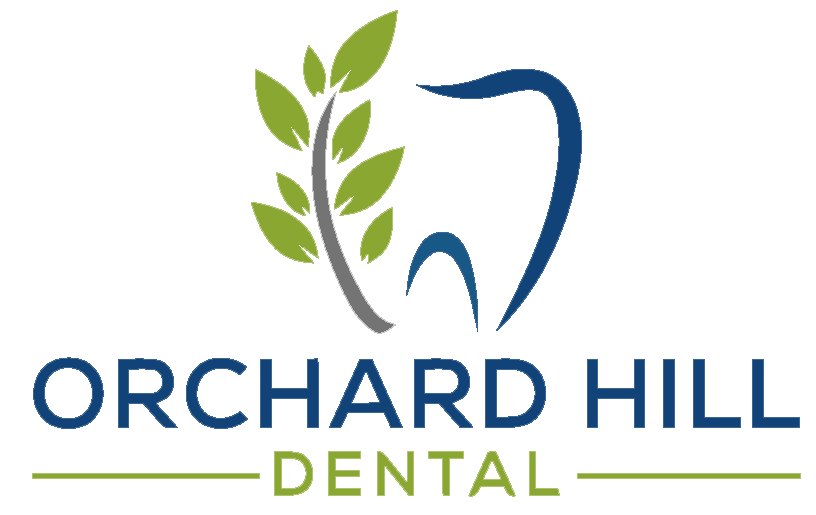Do you suffer from frequent headaches? You may have bruxism.
Also known as teeth grinding, bruxism is a condition that occurs unconsciously. Clenching and grinding your teeth is a very common dental concern, especially if you are experiencing high levels of stress. However, if bruxism is left untreated it can damage your teeth and alignment.
At Orchard Hills Dental in Hendersonville, NC, Dr. Jessica Christy offers treatment options to eliminate headaches as well as the other symptoms that accompany bruxism.

Headaches, Bruxism, and TMJ
Grinding your teeth puts a strain on the large muscles of your jaw, causing them to tense up. If you ignore the problem, these muscles can wind tighter and tighter, exacerbating your problems. High levels of a jaw muscle strain can eventually push your jaw out of alignment and become temporomandibular joint disorders or TMJ.
Disorders of the jaw joints and can manifest in chronic headaches, earaches, jaw or neck pain, and even muscle spasms.
Common symptoms that accompany TMJ headaches may include:
- Teeth grinding or clenching
- Sore jaw or jaw pain
- Neck or shoulder pain
- Limited mobility in the jaw, locking jaw
- Popping noise in the jaw joint
- Pressure in the ear or earaches
Treating Headaches in Hendersonville
For many patients, the best course of treatment is a night mouthguard. This is a simple but effective solution that prevents the teeth from grinding against each other. This both protects the teeth from damage, and relieves tension, allowing the jaw to rest. By wearing this oral appliance every night, or even in stressful situations, patients can enjoy immediate relief of their headaches and migraines.
TMJ Headaches FAQs
TMJ and teeth grinding can cause headaches as severe as migraines. Learn more by reading the answers to these commonly asked questions.
How do I know if my headache is from TMJ?
TMJ headaches are often characterized by pain in the jaw or around the temples and can spread to the forehead, neck, or even the eyes. If you experience jaw pain, a clicking or popping sound when you open or close your mouth, or difficulty chewing, these could be signs that your headaches are related to TMJ. A dentist or doctor can help diagnose the problem through a physical exam and imaging tests.
Can TMJ headaches be mistaken for other types of headaches?
Yes, TMJ headaches can be mistaken for tension headaches or migraines because they often share similar symptoms, such as dull, aching pain and tightness in the head and neck. However, TMJ headaches typically have additional symptoms like jaw pain, facial tenderness, or clicking in the jaw joint. A thorough evaluation by a healthcare professional is essential to determine the cause of the headaches.
How long do TMJ headaches last?
The duration of TMJ headaches can vary depending on the severity of the underlying TMJ dysfunction. In some cases, the headaches may last for a few hours, while in others, they can persist for days or weeks. If left untreated, TMJ headaches can become chronic, so it’s important to seek professional help if the headaches are frequent or severe.
Can TMJ headaches affect sleep?
Yes, TMJ headaches can interfere with sleep, especially if they are related to teeth grinding or jaw clenching during the night. People with TMJ headaches may wake up with jaw pain, tightness, or a headache, making it difficult to get restful sleep. Using a nightguard or mouth splint, which helps to prevent teeth grinding, can reduce nighttime symptoms and improve sleep quality.
How can I prevent TMJ headaches?
Preventing TMJ headaches involves managing factors contributing to jaw tension, such as teeth grinding, jaw clenching, and stress. Wearing a mouthguard while sleeping, practicing good posture, and engaging in stress-reduction activities can help reduce the risk of developing TMJ headaches. Regular visits to a dentist or healthcare provider can also help identify any issues early and prevent them from worsening.
Can TMJ headaches be a sign of a more serious condition?
In most cases, TMJ headaches are not a sign of a more serious condition, but they can indicate an underlying TMJ disorder that requires treatment. If you experience frequent or severe headaches along with other symptoms like jaw locking, difficulty opening your mouth, or significant pain, it’s important to seek professional care. A dentist or doctor can help determine the cause and recommend appropriate treatments to relieve the pain and prevent further issues.
Contact your dentist in Hendersonville, NC for comprehensive analysis and treatment for TMJ issues. Call us at (828) 247-7001 or request an appointment online today.
